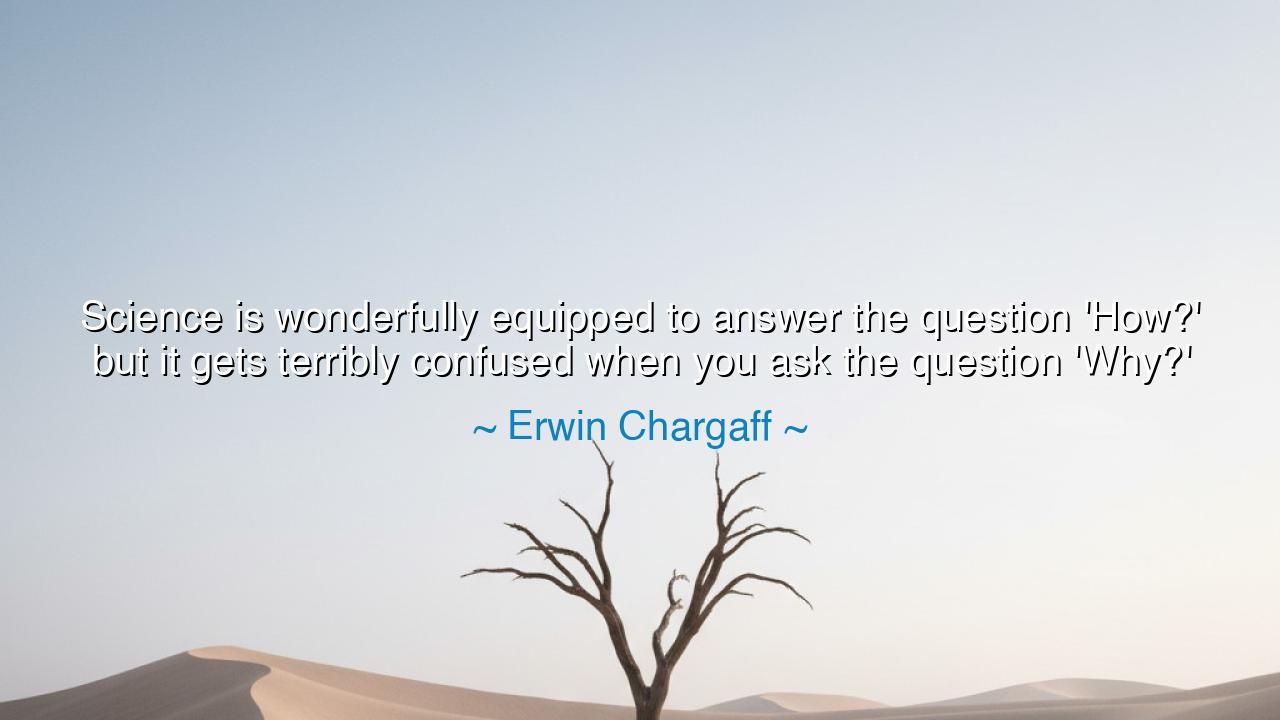
Science is wonderfully equipped to answer the question 'How?' but
Science is wonderfully equipped to answer the question 'How?' but it gets terribly confused when you ask the question 'Why?'






"Science is wonderfully equipped to answer the question 'How?' but it gets terribly confused when you ask the question 'Why?'" These words by Erwin Chargaff pierce to the heart of a profound distinction in human understanding. Science, in its essence, is the great tool of observation, analysis, and explanation. It tells us how the world works—how the stars move, how atoms bond, and how life perpetuates itself. It gives us answers to questions of mechanism: how things happen, how processes unfold, and how nature functions. But, as Chargaff points out, science falters when faced with the deeper question: Why? Why do we exist? Why does the universe operate the way it does? Why is there something rather than nothing? These are questions that reach beyond the realm of empirical evidence and into the domain of philosophy, spirituality, and the mysteries of existence.
In the ancient world, philosophers like Plato and Aristotle grappled with these very questions. Aristotle, the father of logic and natural science, sought to explain the "how" of nature, establishing principles of cause and effect. Yet, even Aristotle, with all his systematic knowledge, could not fully answer the "why"—the ultimate purpose or meaning behind life and the universe. His great work, Metaphysics, ventured into the realm of the unseen, seeking the first cause—the unmoved mover—but stopped short of providing a clear answer to the ultimate questions of existence. Like Chargaff, the ancients recognized that while science (in its various forms) could answer the "how", the "why" remains a mystery—a mystery that invites us to think beyond what we can measure, observe, or prove.
Consider the story of Isaac Newton, whose discoveries laid the groundwork for modern physics. Newton’s laws of motion and universal gravitation offered a mechanical explanation for the how of the heavens. His equations showed how planets moved, how objects fell, and how forces acted in the physical world. Yet, despite his monumental achievements, Newton never fully answered the why of the universe. What was the purpose of all this motion? Why was there such perfect order in the universe? Newton himself, when contemplating the grand order he had uncovered, turned his thoughts toward God, ascribing to the divine the role of the ultimate purpose behind the workings of the cosmos. Newton’s science answered the how, but it was his faith that sought the why—the question that science could not yet touch.
Chargaff's quote also highlights a limitation in the very nature of scientific inquiry. Science is driven by observation, measurement, and repetition—it deals with facts that can be proven and tested. But when we ask the why, we are stepping into a realm where facts and evidence often fail to provide closure. Albert Einstein spoke of this gap in understanding when he famously said, "The most beautiful thing we can experience is the mysterious." Einstein, while a towering figure in the development of theoretical physics, understood that there was a mystery at the heart of the universe that science, in its current form, could not explain. The "why" of existence, the purpose of life, and the meaning of the universe were questions that eluded even the sharpest scientific minds.
In our own time, we find ourselves at a similar crossroads. Modern genetics, with its groundbreaking discoveries in DNA and genetic engineering, can tell us how life is constructed, how traits are passed down, and how the very fabric of life is encoded in the genetic code. But the mystery of life’s purpose, the meaning of consciousness, and the reason for our existence are still questions that science cannot answer. As we uncover the deepest secrets of the natural world, we must recognize that there is a limit to what science can reveal. The "why" remains something we must seek elsewhere—through philosophy, religion, and spiritual exploration.
The lesson from Chargaff's words is not one of rejection, but of balance. Science, in all its glory, is an invaluable tool for understanding the mechanics of the universe. It is through science that we have come to understand medicine, technology, and the natural world. Yet, we must also acknowledge the limitations of science in answering the questions of meaning. The "why" requires more than what we can observe; it requires a deeper exploration of the mystical, the spiritual, and the philosophical dimensions of existence. The true wisdom comes not in relying solely on science to answer all questions, but in embracing both the rational and the mystical, understanding that the answers to life's greatest questions may lie beyond the reach of empirical observation.
In our own lives, we must cultivate both scientific inquiry and a spiritual openness to the mysteries of existence. Let us study the world with the sharpest intellect, uncovering the how of the universe, but let us also seek answers to the why through reflection, meditation, and the wisdom of those who have pondered these questions throughout history. Just as Einstein looked to the mystery of the universe with awe and humility, so too must we approach the questions of life with a balance of knowledge and wonder. Science will illuminate the path, but the "why" may always remain a mystery—a mystery to which we must apply both the tools of reason and the openness of the soul.






AAdministratorAdministrator
Welcome, honored guests. Please leave a comment, we will respond soon